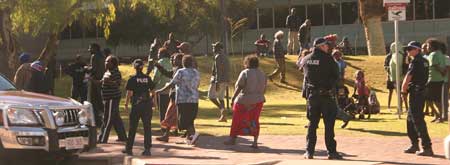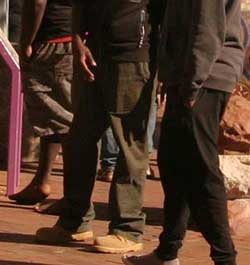Little Sisters attackers sentenced
26 March 2013
Cycle of revenge not ‘traditional’ and cannot be tolerated, says Chief Justice
By KIERAN FINNANE
Two men were sentenced yesterday for their part in the violence at Little Sisters town camp on March 7 last year. Their names are familiar now to anyone who attended the trial of Liam Jurrah, cleared by a jury last week of having caused serious harm to Basil Jurrah, his cousin. Christopher Walker pleaded guilty to causing that harm, which occurred in the company of an unidentified co-offender. Walker hit the victim with the blunt edge of an axe; the unnamed co-offender used a machete and both delivered repeated blows, according to the sentencing remarks of Chief Justice Trevor Riley.
Walker also pleaded guilty to assaults on residents of Little Sisters, Ingrid White and Samuel White, siblings. This was by forming “a common intention” with Josiah Fry who pleaded guilty to the attack on both, punching Samuel White to the head, causing him to black out and fall to the ground, and hitting Ingrid White with a nulla nulla.
Alcohol a factor
Alcohol was a factor in the offending of both men, leading Chief Justice Riley to again call for “worthwhile efforts to curb the flow of alcohol”, as he did last week when sentencing a Warlpiri man for a brutal assault on his wife. We heard from Liam Jurrah, in his record of interview with police, about what they consumed on the night: VB, rum and Smirnoff, then a second session of “the same thing” between five.
 The Chief Justice also commented on the backdrop to the offending: the ongoing feuding between Warlpiri families, often leading to violence, including the fatal stabbing of Kwementyaye Watson in September 2010 (Nathanial Sims is serving six years for negligently causing this death).
The Chief Justice also commented on the backdrop to the offending: the ongoing feuding between Warlpiri families, often leading to violence, including the fatal stabbing of Kwementyaye Watson in September 2010 (Nathanial Sims is serving six years for negligently causing this death).
At left: Police moving in to calm an angry crowd outside the Alice Springs courthouse during the committal hearing of Jurrah, Walker and Fry last year. The cause of a seemingly similar eruption during Liam Jurrah’s recent trial was more complicated, at least in part involving another case.
Walker was involved in the fatal group fight and for his part pleaded guilty to an aggravated assault on Kwementyaye Watson’s brother. He was sentenced to 14 months in gaol, suspended after five months. He walked free on 27 February 2012.
As it happens so did Fry who had been in custody for an offence of damaging property. That was a Monday. Nine days later, on March 7, the Wednesday of the following week, they were on the grog and heading for more trouble. In the case of Walker, 24 years old, the attack on Basil Jurrah would be but the latest in a string of violent incidents.
Violent history
In March 2006 he was sentenced to six months for an aggravated assault which had occurred in January 2006 and to 18 months for unlawfully causing grievous harm in October 2005 (he would have been 16 years old at the time). In July the same year, he was convicted of aggravated assault and sentenced to three months. In October 2007, he was released on a good behaviour bond for threatening with a weapon. In February 2012, he was sentenced to 14 months in relation to an aggravated assault. (It’s not clear from the sentencing remarks why he was at liberty then on March 7, 2012.)
His other criminal history goes back to a first conviction in the juvenile court in 2005. It includes unlawful entry of buildings, stealing, unlawful use of a motor vehicle, breaching orders for release, failing to comply with a restraining order and some traffic matters.
He spent his first few years at Yuendumu until his parents separated when he was three or four. After some time with his mother in Adelaide he was given to his maternal grandmother to be raised at Hermannsburg. His paternal grandmother sometimes had him too, at various places including Murray Bridge.
He was returned to his father when he was 13, spending significant periods living with family at the Warlpiri town camp in Alice Springs. He went to school only occasionally, including Yirara College for a while, but he speaks English reasonably well. He has had some work with CDEP. He has fathered two children, aged six and four, but is not sure of the “status” of his relationship with their mother, having been in custody since his arrest on March 8 2012.
He acknowledges his significant issues with alcohol, said the Chief Justice, and while in gaol has participated in the Safe and Sober course and a family violence course.
The Chief Justice said Walker would be well advised to continue to take rehabilitation courses while in gaol, which will be for at least the next two years. His non-parole period was set at three years, backdated to his arrest. His head sentence was four years and six months.
Fry’s prospects ‘positive’
He assessed Walker’s prospects for rehabilitation at this time as “poor”, but Fry’s on the other hand are “positive”.
He was born in Adelaide and went to primary school there. His parents separated when he was ten as a result of his father’s excessive drinking. He moved with his mother to Alice Springs where he again went to school. He can read and write English although he left school at the age of 13 after his Warlpiri initiation. He can play keyboards and guitar and was a good footballer in the past.
 His mother has worked including in “responsible employment” but he, a 21 year old, has never worked. His father worked “sporadically”. Fry has expressed “a desire to work”, said the Chief Justice, but “whether you do obtain work or not is of course in your own hands.”
His mother has worked including in “responsible employment” but he, a 21 year old, has never worked. His father worked “sporadically”. Fry has expressed “a desire to work”, said the Chief Justice, but “whether you do obtain work or not is of course in your own hands.”
At right: Josiah Fry (in the middle) wore work boots to the committal last year but the 21-year-old father of one has never had a job.
He began drinking when he was 18, regularly getting “full-drunk” although he claimed not to have been on March 7. He has convictions for traffic offences including driving under the influence. He also has convictions for going armed in public, damaging property, breaching a domestic violence order, engaging in violent conduct, for which he was fined $500, and breaching bail.
He is in a relationship and is the father of a young child. The child’s mother is willing to join him after his release from gaol, when he will live with a maternal aunt in a remote community north-east of Alice, an arrangement put in place by his mother who supported her son throughout the proceedings.
Fry was sentenced to 24 months suspended after 10. He has spent five on remand so has five more to go. Upon his release he will remain under supervision for two years. He will have to immediately enter a residential alcohol rehabilitation program at DASA and after that travel directly to his aunt’s community. He is not allowed in Alice Springs or Yuendumu during the supervision period except in the case of a medical emergency. He is also not allowed to drink alcohol during that time.
With these arrangements the Chief Justice hopes, in the case of Fry, to provide an opportunity for breaking the cycle of offending and for him “to make a life for yourself and your family which does not involve alcohol and does not involve violence”.
The Chief Justice commented that it is “doubtful” whether the particular events of March 7 would have occurred “had the main participants not been intoxicated”.
Feuding groups
He said that since Kwementyaye Watson’s death in 2010 people associated with each of the feuding groups “have come before the court for offences of violence committed against members of the opposing group. Many people have been injured and others have gone to gaol, sometimes for long periods.”
He said that there is “no suggestion that what is occurring is in any way a traditional response to the events of 2010 or the subsequent events. What is involved is revenge attacks and counter attacks. Those involved are taking the law into their own hands. In this case, it was a group invasion involving offending in company.
“The cycle of violence cannot be tolerated and offenders must be met with serious punishment. The sentences that I impose must emphasise the need for punishment, deterrence and protection of the community.
“I understand that significant efforts have been made by responsible authorities to mediate between the groups involved in this ongoing disputation. I understand those efforts are ongoing and I encourage those involved to persist.”



Thank you, Kieran Finnane, for a clear report that simply sets out the facts (as we know them) on the behaviours of the men involved in this case. You write objectively so the reader can follow the thread of the story and with no opinions or opinionated comments by yourself. The facts tell the story. Like some others, I know personally some of these men and the families involved. I also know and appreciate many of the complex histories that have led to these events. Your journalism helps give the picture.